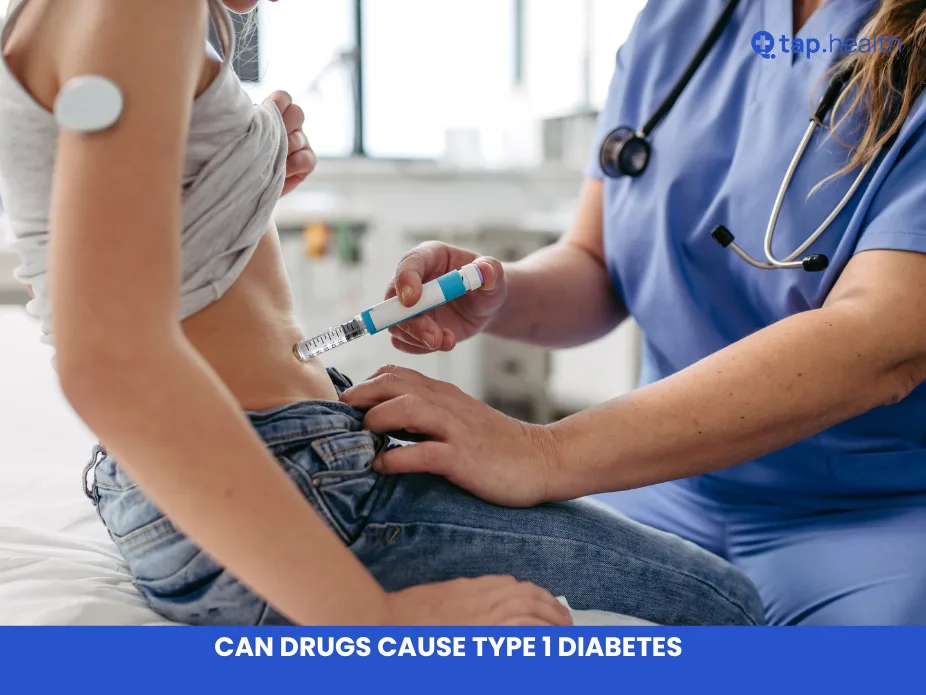Type 1 diabetes is a chronic condition that affects the way your body processes blood sugar (glucose). Unlike Type 2 diabetes, which is often linked to lifestyle factors, Type 1 diabetes is an autoimmune condition. But can drugs cause Type 1 diabetes? This question often arises, especially when people start noticing symptoms of diabetes after taking certain medications. In this article, we’ll explore the possible connection between drugs and Type 1 diabetes, how certain medications might trigger it, and what you can do if you’re concerned.
What is Type 1 Diabetes?
Before diving into whether drugs can cause Type 1 diabetes, let’s first understand what Type 1 diabetes is.
Type 1 diabetes occurs when your immune system mistakenly attacks the insulin-producing cells in your pancreas called beta cells. Insulin is essential because it helps move glucose from your blood into your cells, where it’s used for energy. Without enough insulin, glucose builds up in your bloodstream, leading to high blood sugar levels.
People with Type 1 diabetes must rely on insulin therapy to manage their condition. The exact cause of Type 1 diabetes is not fully understood, but genetics and environmental factors (such as viral infections) are believed to play a role.
Can Drugs Cause Type 1 Diabetes?
The direct link between drugs and Type 1 diabetes is a complex topic. While no drugs have been definitively proven to “cause” Type 1 diabetes, some medications can trigger or worsen conditions that could eventually lead to diabetes. However, it’s important to note that these drugs don’t directly cause Type 1 diabetes in the way that insulin resistance leads to Type 2 diabetes.
Drugs That Might Trigger an Autoimmune Reaction
Some medications, particularly those that affect the immune system, could potentially trigger an autoimmune reaction that harms insulin-producing beta cells in the pancreas. This could theoretically contribute to the development of Type 1 diabetes. While these cases are rare, it’s important to be aware of the possibility.
1. Medications for Viral Infections
There have been studies suggesting that certain antiviral drugs could contribute to the development of Type 1 diabetes in some individuals. For example, some research has found that medications used to treat viral infections like the flu could trigger an autoimmune response in people genetically predisposed to Type 1 diabetes.
2. Immunosuppressive Drugs
Immunosuppressive drugs, which are often prescribed to people with autoimmune diseases, could also increase the risk of developing Type 1 diabetes. These medications suppress the immune system to prevent it from attacking the body, but they could also weaken the body’s ability to protect itself from other immune responses, including the attack on the pancreas.
3. Beta-blockers
Beta-blockers are commonly prescribed for high blood pressure, heart conditions, and other cardiovascular issues. Some studies have suggested that beta-blockers might affect glucose metabolism and insulin production. While this doesn’t directly lead to Type 1 diabetes, it could aggravate existing diabetes or make the condition harder to manage.
4. Corticosteroids
Corticosteroids, which are used to treat inflammation and autoimmune diseases, have been linked to an increased risk of developing diabetes, especially in individuals who are genetically predisposed to the disease. Long-term use of these medications can raise blood sugar levels, and in some rare cases, it might trigger an autoimmune response that damages the pancreas, leading to Type 1 diabetes.
Are There Any Cases of Drugs Directly Causing Type 1 Diabetes?
There have been anecdotal reports and a few studies that suggest certain drugs might be linked to the onset of Type 1 diabetes. However, these cases are extremely rare and typically involve a combination of genetic factors and other environmental triggers. In most cases, the drugs themselves don’t “cause” Type 1 diabetes but may trigger an underlying autoimmune response in individuals who are already at risk.
It’s important to remember that Type 1 diabetes is primarily an autoimmune disease, meaning it occurs when the body’s immune system attacks its own cells. The use of certain medications could potentially increase the risk of this immune response, but the drugs are not the primary cause of Type 1 diabetes.
What Are the Symptoms of Type 1 Diabetes?
If you’re concerned that a drug might be causing symptoms of Type 1 diabetes, it’s important to recognize the signs. Type 1 diabetes develops quickly, and symptoms can appear in a matter of days or weeks.
Key Symptoms of Type 1 Diabetes:
- Frequent urination (especially at night)
- Extreme thirst
- Unexplained weight loss
- Fatigue or tiredness
- Blurred vision
- Cuts or bruises that are slow to heal
- Mood swings or irritability
If you experience any of these symptoms while on a medication, it’s important to speak with your healthcare provider immediately. They can help determine whether your symptoms are related to diabetes or another health condition.
How Can You Manage Type 1 Diabetes?
If you have been diagnosed with Type 1 diabetes, managing the condition is essential to prevent complications. Here are some key steps in managing the disease:
1. Insulin Therapy
People with Type 1 diabetes must take insulin to help manage blood sugar levels. Insulin can be injected or delivered through an insulin pump. Your doctor will work with you to determine the right type and dosage of insulin for your needs.
2. Healthy Diet
A balanced diet is important for managing Type 1 diabetes. Foods that are high in fiber, lean proteins, and healthy fats can help stabilize blood sugar levels. It’s also important to monitor carbohydrate intake since carbs can raise blood sugar levels.
3. Regular Exercise
Exercise is crucial for managing blood sugar levels. Physical activity helps the body use insulin more efficiently, which can help keep blood sugar levels stable. Be sure to work with your doctor to develop an exercise plan that’s safe and effective for you.
4. Blood Sugar Monitoring
Regularly checking your blood sugar levels is essential for managing Type 1 diabetes. Your doctor will recommend how often you should check your levels and what your target range should be.
5. Education and Support
Living with Type 1 diabetes can be challenging, but with the right support, it’s possible to lead a healthy life. Support groups, education programs, and working with healthcare providers can help you manage your condition effectively.
Can Type 1 Diabetes Be Prevented?
Currently, there is no known way to prevent Type 1 diabetes. Since it’s an autoimmune disease, the best prevention is being aware of the risk factors and managing your health proactively. While there is no cure for Type 1 diabetes, research is ongoing, and scientists are working to better understand the condition and how it might be prevented or cured in the future.
Expert Opinions on Drugs and Type 1 Diabetes
Dr. Sangeeta Desai, an endocrinologist in Mumbai, emphasizes that while medications like immunosuppressants and steroids have been shown to have potential links to Type 1 diabetes, they are not direct causes. “The onset of Type 1 diabetes is most often triggered by a combination of genetic susceptibility and environmental factors, such as viruses or infections,” she says. “Medications can sometimes play a role, but they are just one part of a larger puzzle.”
Expert contributions:
For more detailed research on medications and autoimmune conditions, visit the American Diabetes Association.
Recommendations Grounded in Proven Research and Facts
If you are concerned about the impact of medication on your risk for Type 1 diabetes, here are a few recommendations:
- Consult with your doctor: If you’re taking immunosuppressive drugs or steroids, talk to your healthcare provider about your risks and what steps you can take to protect your health.
- Monitor your health regularly: If you’re on medications that may affect blood sugar levels, regular check-ups and monitoring are essential to catch any early signs of diabetes.
- Maintain a healthy lifestyle: Eating a balanced diet, exercising regularly, and avoiding smoking can help manage your overall health and reduce the risk of developing any form of diabetes.
Real-Life Scenarios
Let’s take a look at a couple of examples to help you understand how medication might interact with the development of Type 1 diabetes.
Example 1: Rajesh’s Story (Earlier Mentioned)
Rajesh, a 32-year-old man from Mumbai, had been on immunosuppressive drugs after a kidney transplant. Years later, he was diagnosed with Type 1 diabetes. While his medications didn’t directly cause the diabetes, they may have increased his susceptibility by affecting his immune system.
Example 2: Priya’s Case
Priya, a 24-year-old woman from Delhi, was prescribed steroids to treat her autoimmune thyroid disorder. Over the months, she noticed her blood sugar levels were higher than normal. After consulting her doctor, it was clear that the steroids were affecting her insulin sensitivity. Again, while this didn’t lead to Type 1 diabetes, it highlighted the importance of regular monitoring.
Also read this : Is Type 2 Diabetes Hereditary
FAQs on Can Drugs Cause Type 1 Diabetes?
Q: Can Type 1 diabetes be caused by medications?
A: While no medications directly cause Type 1 diabetes, certain drugs like immunosuppressants and steroids can affect the immune system and metabolism, potentially increasing susceptibility to the disease.
Q: Are there any specific drugs that increase the risk of Type 1 diabetes?
A: Some immunosuppressive drugs, antipsychotics, and steroids have been linked to autoimmune responses that could influence the development of Type 1 diabetes.
Q: What should I do if I’m taking medication that affects blood sugar?
A: Consult your doctor for guidance, regularly monitor your blood sugar, and maintain a healthy lifestyle to reduce the risk of diabetes.
Q: Does taking medications for Type 1 diabetes cure it?
A: No, medications like insulin help manage Type 1 diabetes, but they do not cure it.
Conclusion
While drugs don’t directly cause Type 1 diabetes, some medications can influence the immune system or metabolism, making individuals more susceptible to autoimmune diseases like Type 1 diabetes. It’s important to manage medications with the guidance of your healthcare provider and to stay informed about any potential risks. Regular check-ups and a healthy lifestyle can go a long way in preventing complications.



